2013高考英语一轮关系副词引导的定语从句
图片预览
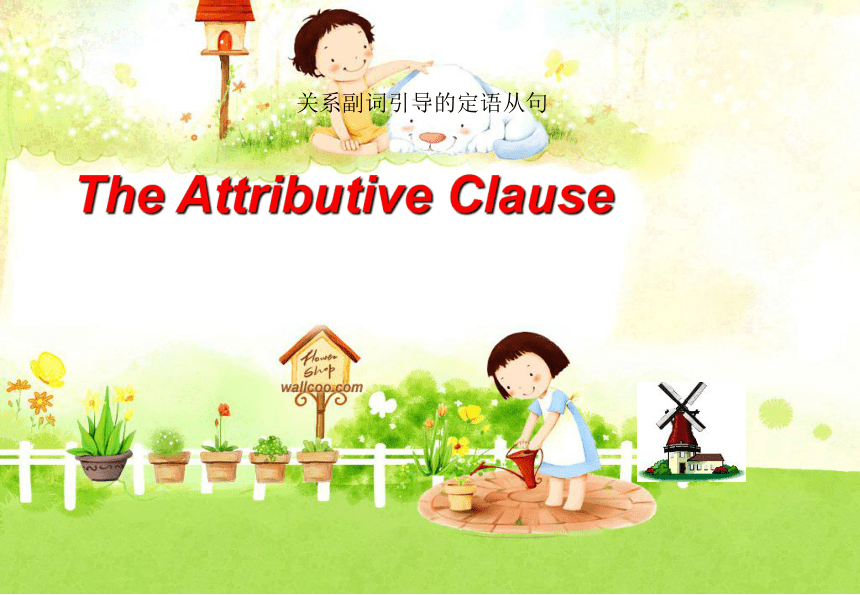
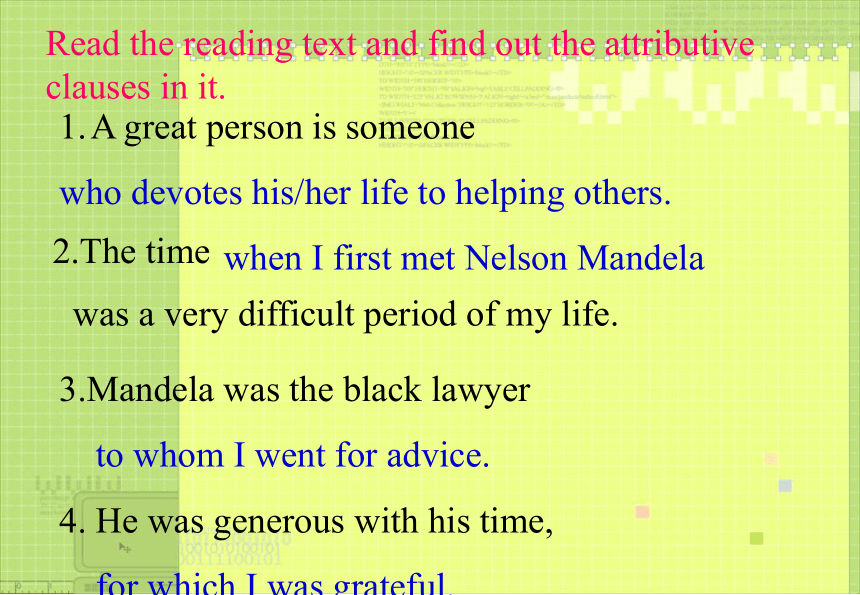
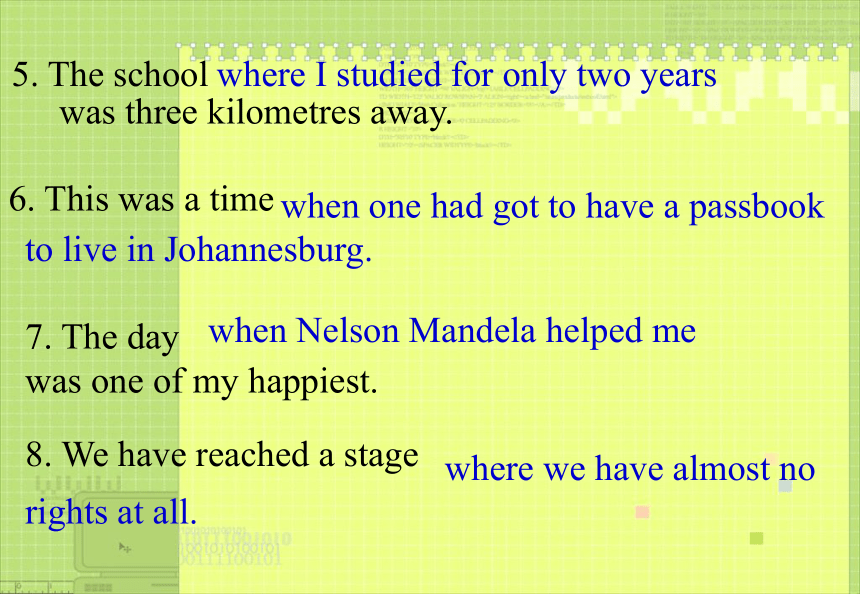
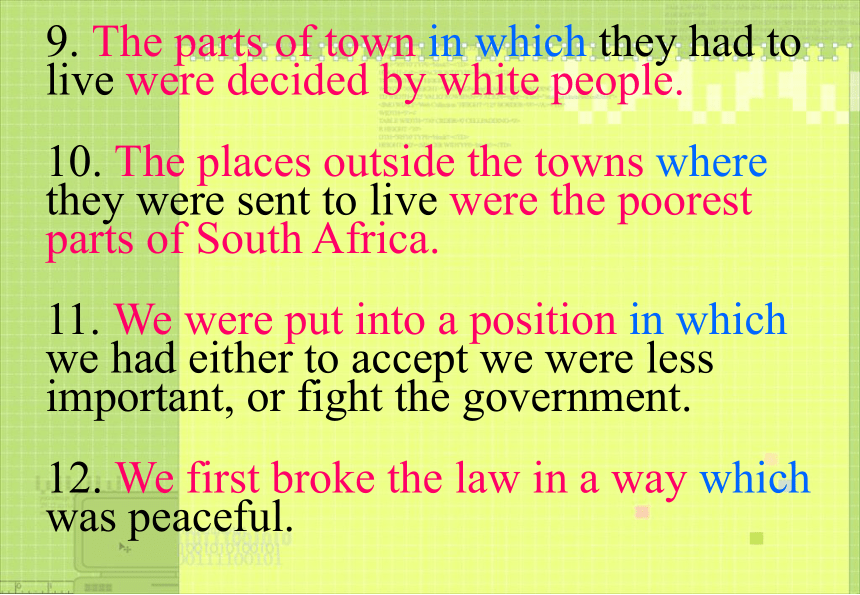
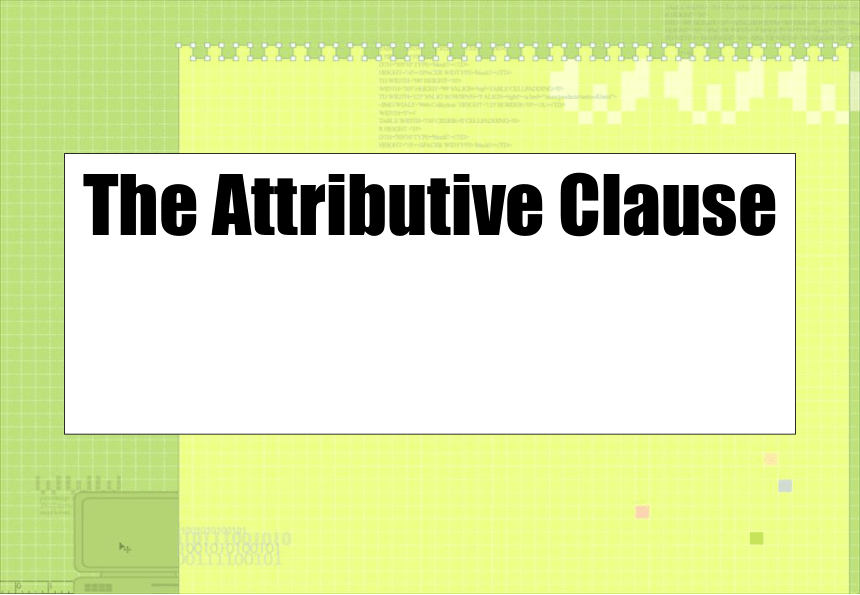
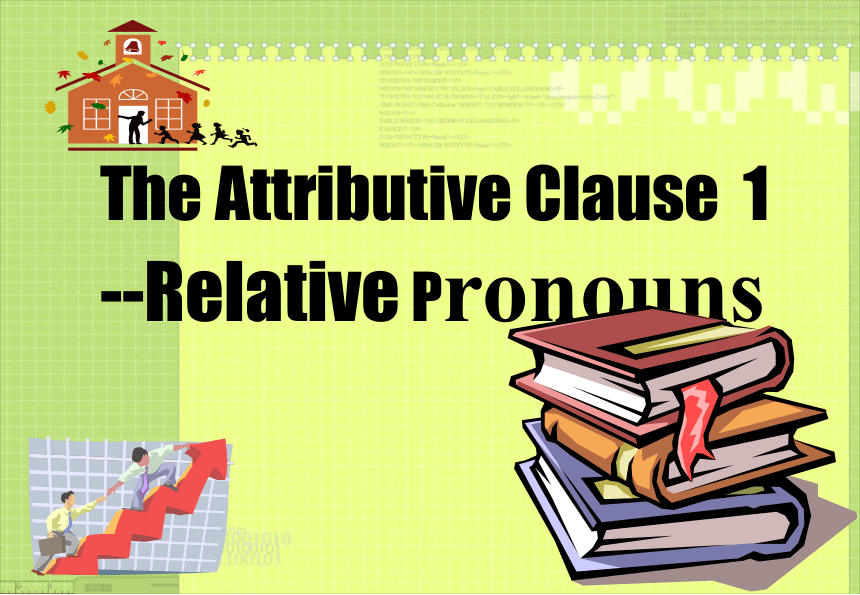
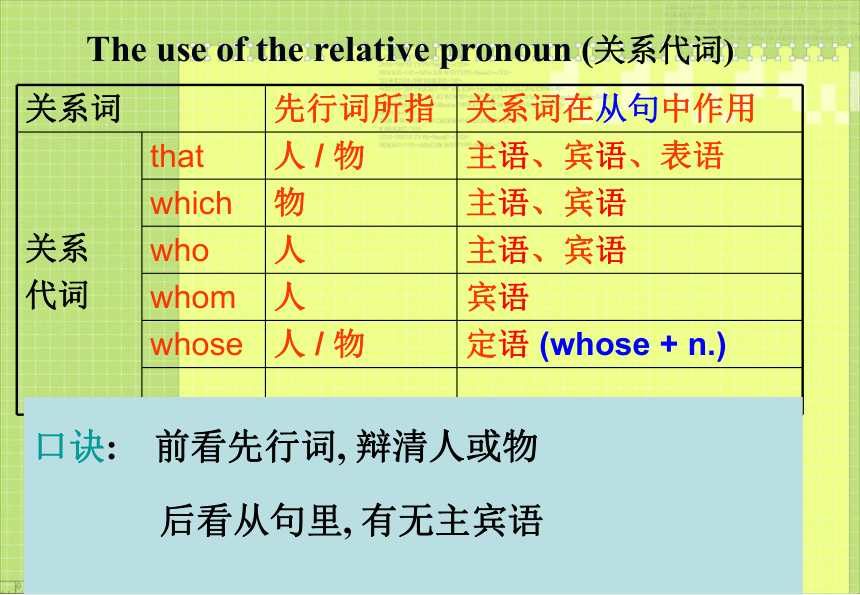
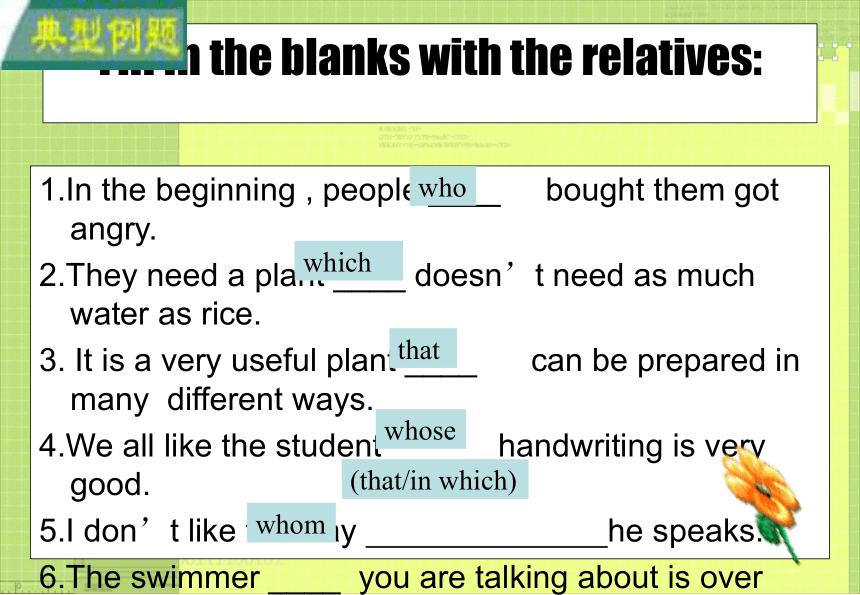
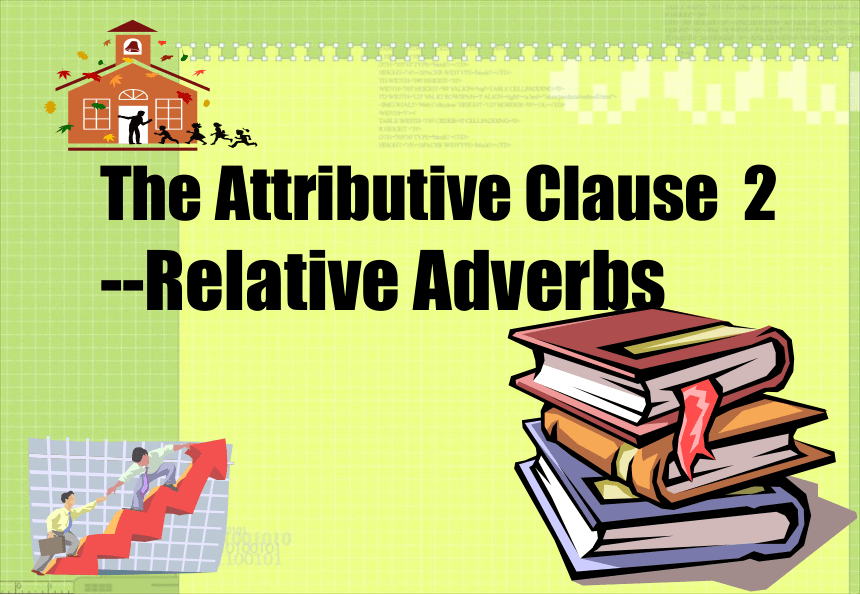
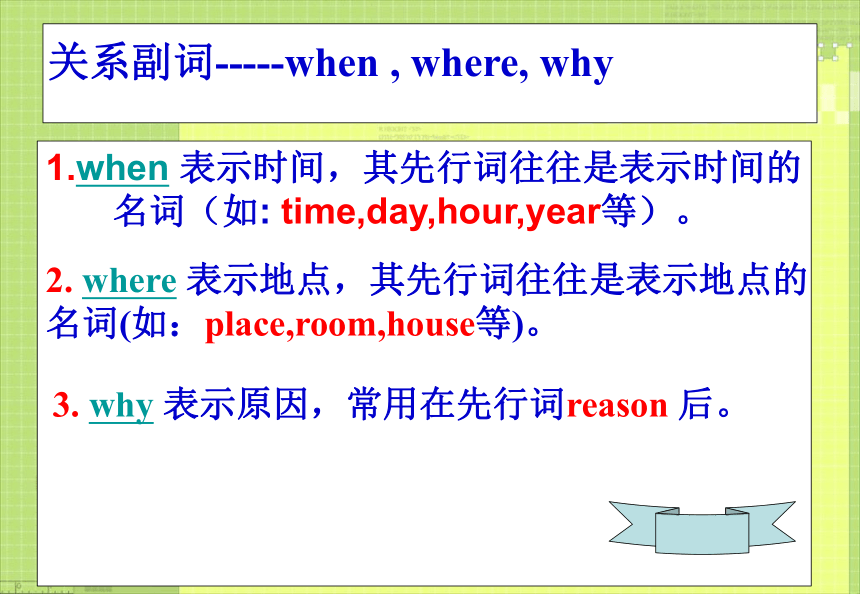
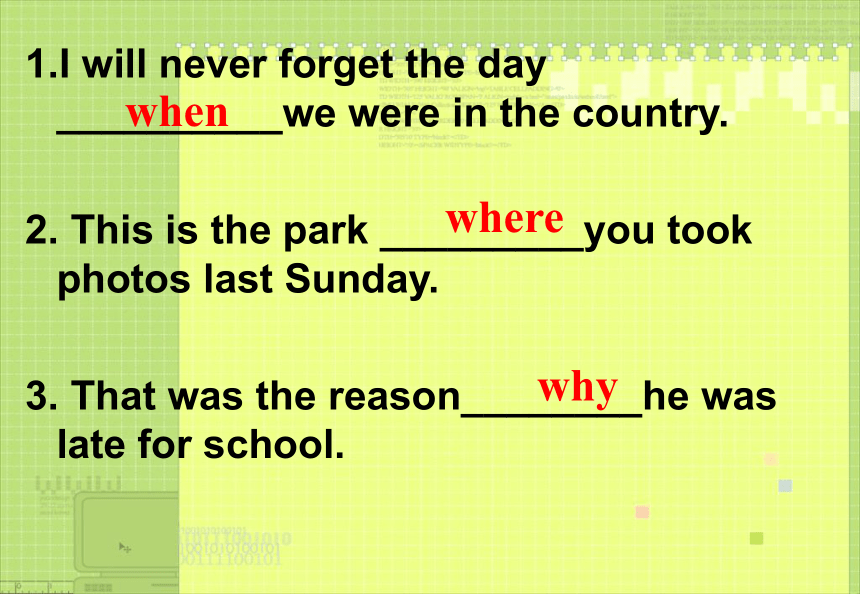
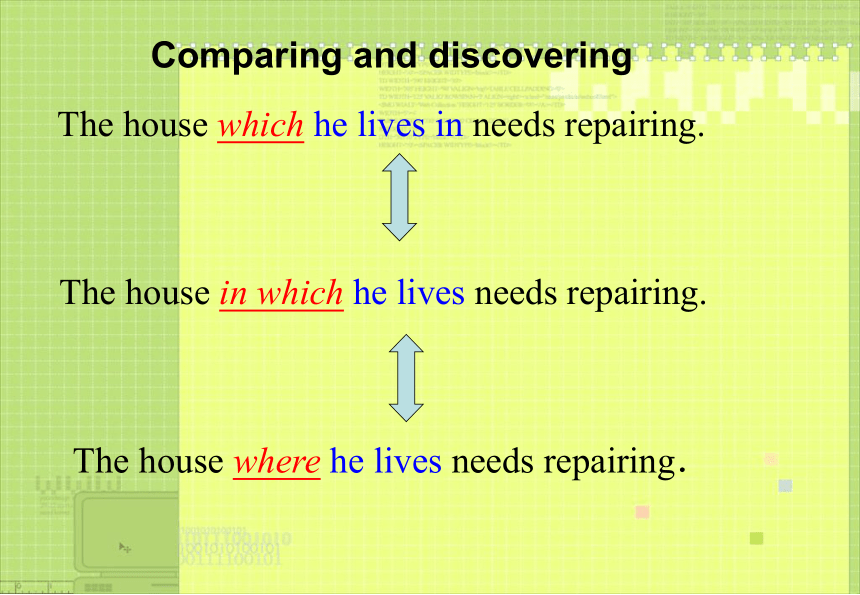
文档简介
课件56张PPT。The Attributive Clause关系副词引导的定语从句A great person is someone
who devotes his/her life to helping others.
when I first met Nelson Mandela
3.Mandela was the black lawyer
to whom I went for advice.
4. He was generous with his time,
for which I was grateful.2.The timewas a very difficult period of my life.Read the reading text and find out the attributive clauses in it. where I studied for only two years
when one had got to have a passbook to live in Johannesburg.
7. The day was one of my happiest.
where we have almost no rights at all.5. The schoolwas three kilometres away.6. This was a timewhen Nelson Mandela helped me8. We have reached a stage9. The parts of town in which they had to live were decided by white people.
10. The places outside the towns where they were sent to live were the poorest parts of South Africa.
11. We were put into a position in which we had either to accept we were less important, or fight the government.
12. We first broke the law in a way which was peaceful.The Attributive ClauseThe Attributive Clause 1
--Relative PronounsThe use of the relative pronoun (关系代词)
口诀: 前看先行词, 辩清人或物
后看从句里, 有无主宾语
Fill in the blanks with the relatives:1.In the beginning , people ____ bought them got angry.
2.They need a plant ____ doesn’t need as much water as rice.
3. It is a very useful plant ____ can be prepared in many different ways.
4.We all like the student _____ handwriting is very good.
5.I don’t like the way he speaks.
6.The swimmer ____ you are talking about is over there.whowhichthatwhose(that/in which)whomThe Attributive Clause 2
--Relative Adverbs1.when 表示时间,其先行词往往是表示时间的名词(如: time,day,hour,year等)。
2. where 表示地点,其先行词往往是表示地点的名词(如:place,room,house等)。
3. why 表示原因,常用在先行词reason 后。关系副词-----when , where, why1.I will never forget the day __________we were in the country.
2. This is the park _________you took photos last Sunday.
3. That was the reason________he was late for school.
whenwhere why The house which he lives in needs repairing.The house in which he lives needs repairing.The house where he lives needs repairing. Comparing and discovering
The reason why Jim was happy to help Mandela was helping others.The reason for which Jim was happy to help Mandela was helping others..The day when Mandela told me what to do and helped him was the happiest day for Jim?The day on which Mandela told me what to do and helped him was the happiest day for Jim关系副词的用法时间时间状语地点地点状语原因原因状语I still remember the days ________ we spent in the country.
I still remember the days ________________ we studied together.
The factory__________ we visited is far away.
The factory ______________ this kind of cars are made is very modern.
I don’t know the reason _____________ he is angry with me.
The reason ___________ he gave for his being absent isn’t acceptable. which/that when/during which which/that where/in which why/ for whichthat/which以下名词之后也通常用where/in which引导的定语从句:situation, case, point, position, article, sentence, line, word, queue等等。We were put in a position in which/where we had either to accept we were less important, or fight the government.e.g. This is the point where I don't agree.Pay attention, please!They are in such a situation where everything is in disorder.
The police are looking into the case where two VIPs were killed.
Can you make a sentence where this verb can be used?
They were at the point where/at which they had to decide what to de next.
In the super market, we always see a long queue where people are waiting fir things on sale.
This is the factory where/in which he worked ten years ago.
This is the factory which /that make toys.注意:当先行词是时间、地点、原因时,定语从句的引导词在从句中做状语时才用关系副词when、 where、 why;如做主语、宾语、表语仍用关系代词that、 which即:当先行词是表时间、地点、原因时不一定由关系副词when,where,why引导定语从句,还要看从句句子成分而定。当从句谓语动词是及物动词且从句无宾语时,由关系代词引导定从’;当从句谓语动词是及物动词但有宾语时,由关系副词引导定从’ ;当从句谓语动词是不及物动词时,由关系副词引导定从’。Finish the following attributive clauses.1. I will never forget the day __________we spent together.
I will never forget the day _____________I left my hometown.( which /that)when/ on which2. This is the house ________ I visited last year. This is the house ________ I studied art. (which/that)where/ in which3. I don't believe the reason ______________ Tom has given to us.
I don't know the reason ______________Tom is crying.(which/that)why/ for which小结:关系词的选择1. 看关系词(先行词)在从句中充当的成分
主语,宾语———关系代词
状语——————关系副词2. 先行词前是否要介词
要——————关系副词
不要—————关系代词介词+关系代词“介词+关系代词”引导定语从句时,介词的宾语只能用which(指物)或whom(指人),whose即可指人也可指物,即介词+which/whom/whose.
介词+which/ whom引导的定语从句1. 介词的选用原则:根据定语从句谓语动词的习惯搭配来决定。
This is the book on which I spent 8 dollars.
This is the book for which I paid 8 dollars.四. “介词+which/whom”引导的从句, 1.介词选用原则
(2) 根据先行词的习惯搭配来决定。I remember the day on which I joined the Party.
I remember the days during which I lived there.总结:关系代词前介词的确定:They’ll never forget July 1 on which Hong Kong returned to its motherland.
1992 is the year in which you were born.小结1:根据先行词的习惯搭配The school to which I was sent was very large.
Hong Kong is the city from which he comes.小结2:根据定语从句中动词所需习惯搭配Wu Song was the man by whom the tiger was shot.小结3:根据定语从句的意义
2. 当介词放在关系代词前面时,关系代词只能用whom(指人)或which(指物),且关系代词不能省略。The man with whom you talked just now is my neighbor.
I can’t find the pen with which I was writing .2. 介词位于关系代词前,关系代词的使用
3. 当介词位于定语从句末尾时,可用 which/that(指物), who/whom/that(指人)作从句中介词的宾语.而且作介词宾语的关系代词可以省略。(whom/who/that)(which/that)Dad is a person________________ I can easily talk to.Is this the play ___________ you were talking about just now?3. 介词位于句末,关系代词的使用
4. 在一些固定搭配的动词短语中,由于动词和介词不可分割,因此不能把介词置于关系代词之前。如:This is the watch (that/ which) I am looking for.
The babies (who/ whom/ that) the nurse is looking after are very healthy.4. 含介词的固定搭配动词短语的使用
5. 先行词是the way,意为“方式,方法”时,引导定语从句的关系词用that/ in which或省略。 I didn't like the way _______________
she talked to me.
The way _________________he
teaches English is interesting.(that/in which)(that/in which)5. 先行词为the way,关系词的使用练习用适当的介词补充完整下列定语从句。
1. I disagree with the facts ______ which your argument is based.
2. The song, ______ which he was interested, will never be heard again.
3. This is the reason ______ which he often comes to school late.
4. I will never forget the way ______ which my teacher taught me.
5. This is the hero ______ whom we are proud. on in forinof6. I want to find the very pen ______ which I wrote that letter.
7. They are the students ______ whom our teachers are thinking highly.
8. It is important to choose good friends ______ whom you can share your feelings and thoughts.
9. It will not be necessary to name the person ______ whom the card belongs.
10. I would always like to do business with those people ________ whom I can rely.withof withtoon / upon关系代词that和which在很多情况下可以互换,但哪些情况只能用that?考点一只用that,不用which1.all, little, much, few, none, everything, nothing, something, anything 等不定代词作先行词或者先行词被其所修饰时; All that can be done has been done.
2. 序数词或形容词最高级修饰先行词时; This is the best TV that is made in China.
3. 先行词前有the only, the very, the same, the right等修饰时;
4.先行词既有人也有物
5.主句以which, who, what开头的疑问句.Who that you have ever seen can do it better ?1.He did all / everything _______he could to help me.
2.This is the very thing _______ I am after.
3.We talked about the men and the things _______
we remembered at school.
4.He is the only man _______ can do the work.
5.This is the first thing _______ I want to say.
6.He is the finest man _______ I have ever worked
with.
7.Who is the man _______ spoke to you at the gate.
8.Which is the star _______ is nearest to the earth.
that , which or who?thatthatthatthatthatthatthatthat有哪些情况关系代词不用that,而用which,who,whom?考点二只用which,不用that有机器的房间是车间。The room __________ there is a machine is a workshop.
The room __________ there is a machine in is a workshop.in which(which/ that)一、非限制性定语从句二、用在介词后I have lost the pen, _____ I like very much.which1、在非限制性定语从句中,指事物用which,指人用who或whom.1.He made the same mistakes again ,_____ made his parents very angry.
2.Yesterday I bought a dictionary,_______ cost me more than 100 yuan .
3.Mr Smith,_______ gave a talk several months ago,will come again.
4.My uncle has come back from abroad,______ I haven’t met for a long time.whichwhichwhowhomFill in the blanks1.Her bag ,in which she put all her money, has been stolen.
2.This is the ring on which she spent 1000 dollars.
3.Xiao Wang ,with whom I went to the concert, enjoyed himself very much.2、在介词后面,指事物用 which,指人用whom.(3) whose引导的定语从句注意点①whose引导定语从句,其后应紧跟名词,构成名词短语。
② whose与它所修饰的名词一起可以作介词的宾语。如:
The boss in whose department he worked had heard the news.他工作所在部门的老板已经听说了这个消息。(3)whose引导的定语从句注意点④whose的先行词指物时,可用of which代替,但语序不同,即whose+名词 = the+名词+of which,或= of which + the + 名词。如:
The novel whose title (= the title of which或of which the title) is Red and Black is very interesting.③ whose引导的定语从句,其先行词既可以指人也可以指物。⑤whose的先行词指人时,可用of whom代替,但语序不同,即whose+名词 = the+名词+of whom,或= of whom + the + 名词。如:
The boy whose mother (= the mother of whom或of whom the mother) is a doctor is my friend.用适当的关系代词填空1 . The girls ________ served in the shop were the owner'sdaughters.2 .The ladder on ________ I am standing was bought in thesupermarket.3.The girl _____________________ I spoke to was a student.4.He hides all the people and things ________ he knows.
5.He saw a house ________ windows were all broken.
6.All the apples ________ fall are eaten by wild bears.
7.Can you think of anyone ________ could look after him?
8.This is the best restaurant ________ I have known.who/that which whom/that/who that
whose that who that9 .He showed a machine ________ parts are too small to beseen.10.You can take any room ________ you like.11 . The road conditions there turned out to be very good,________ was more than we could expect.12.He was educated at the local high school, after ________he went on to Beijing University.13 .Among the winners stands little Tom ________ father isseriously ill in hospital.14 . Do you still remember the chicken farm ______ _ wevisited three months ago?
whose that which
which
whose
(that/which)翻译
1.他指给我看他丢钱包的地方。
2.我不认识那个和你说话的女孩。
3.她是一个叫玛丽的女孩。
He showed me the place where he lost his wallet.
I don’t know the girl whom/that you
speak to.
She is a girl who is called Mary.
4.那些正在打网球的男孩是我的朋友。
Those boys who are playing tennis are
my friends.对比练习1.他是一个学生。他学习很努力。
2.他是一个学生,并且他学习很努力。
他是一个学习很努力的学生。
4.他有两个儿子,都是老师。
He has two sons, _____ are teachers.
A.????A.both of them B. both of whom
5.他死了, 这对他老婆是一个打击。
He died, and __ was a heavy blow to his wife.
He died, ______ was a heavy blow to his wife. whoB it whichHe is a student. He studies hard.He is a student, and he studies hard.3.He is a student ____ studies hard.See you!Good-bye Thank you !练习1.The reason ___ he didn’t pass the exam was that he didn’t study hard.
A. which B. in which
C. for which D. of which
2.The school ___ my sister studies at is far from here.
A.where B. that C. at which D. in which
3.the days are gone forever ___ we used foreign oil.
A. when B. that C. which D. at which
4.My hometown is no longer the place ___ it used to be.
A. that B. what C. where D. as5.He was the only one of the boys who ___ late for school.
Are B. were C. is D. was
6.He is the guest ___ the manager first introduced.
Whose B. to whom C. who D. of whom
7.He made a hole in the wall___ he could get onto the house.
A. in which B. which
C. through which D. by which8. After living in Paris for fifty years he returned to the small town ___ he grew up as a child.
which B. where C. that D. when
9.I can still remember the sitting room ___ my brother and I used to sit in the evening.
A. Of which B. which C. that D. where10.We shall never forget the days ___ we worked together.
A. that B. in which C. on which D. which
11. I still remember the year ___ we spent together.
A. / B. when C. on which D. in which
12.I can think of many cases ___ students obviously knew a lot of English words and expressions but couldn’t write a good essay.
A. why B. which C. as D. where用定语从句翻译下面的句子
1.玉米是人和动物都可以使用的植物。
2.我们昨天看的那场电影一点意思也没有。
3.我在商店碰到的那位妇女是我的一位老同学。
4.学习不刻苦的那些人是不会通过这次考试的。
5.我住在窗户朝南的那个房间。
6.任何人犯法都应受到惩罚。
who devotes his/her life to helping others.
when I first met Nelson Mandela
3.Mandela was the black lawyer
to whom I went for advice.
4. He was generous with his time,
for which I was grateful.2.The timewas a very difficult period of my life.Read the reading text and find out the attributive clauses in it. where I studied for only two years
when one had got to have a passbook to live in Johannesburg.
7. The day was one of my happiest.
where we have almost no rights at all.5. The schoolwas three kilometres away.6. This was a timewhen Nelson Mandela helped me8. We have reached a stage9. The parts of town in which they had to live were decided by white people.
10. The places outside the towns where they were sent to live were the poorest parts of South Africa.
11. We were put into a position in which we had either to accept we were less important, or fight the government.
12. We first broke the law in a way which was peaceful.The Attributive ClauseThe Attributive Clause 1
--Relative PronounsThe use of the relative pronoun (关系代词)
口诀: 前看先行词, 辩清人或物
后看从句里, 有无主宾语
Fill in the blanks with the relatives:1.In the beginning , people ____ bought them got angry.
2.They need a plant ____ doesn’t need as much water as rice.
3. It is a very useful plant ____ can be prepared in many different ways.
4.We all like the student _____ handwriting is very good.
5.I don’t like the way he speaks.
6.The swimmer ____ you are talking about is over there.whowhichthatwhose(that/in which)whomThe Attributive Clause 2
--Relative Adverbs1.when 表示时间,其先行词往往是表示时间的名词(如: time,day,hour,year等)。
2. where 表示地点,其先行词往往是表示地点的名词(如:place,room,house等)。
3. why 表示原因,常用在先行词reason 后。关系副词-----when , where, why1.I will never forget the day __________we were in the country.
2. This is the park _________you took photos last Sunday.
3. That was the reason________he was late for school.
whenwhere why The house which he lives in needs repairing.The house in which he lives needs repairing.The house where he lives needs repairing. Comparing and discovering
The reason why Jim was happy to help Mandela was helping others.The reason for which Jim was happy to help Mandela was helping others..The day when Mandela told me what to do and helped him was the happiest day for Jim?The day on which Mandela told me what to do and helped him was the happiest day for Jim关系副词的用法时间时间状语地点地点状语原因原因状语I still remember the days ________ we spent in the country.
I still remember the days ________________ we studied together.
The factory__________ we visited is far away.
The factory ______________ this kind of cars are made is very modern.
I don’t know the reason _____________ he is angry with me.
The reason ___________ he gave for his being absent isn’t acceptable. which/that when/during which which/that where/in which why/ for whichthat/which以下名词之后也通常用where/in which引导的定语从句:situation, case, point, position, article, sentence, line, word, queue等等。We were put in a position in which/where we had either to accept we were less important, or fight the government.e.g. This is the point where I don't agree.Pay attention, please!They are in such a situation where everything is in disorder.
The police are looking into the case where two VIPs were killed.
Can you make a sentence where this verb can be used?
They were at the point where/at which they had to decide what to de next.
In the super market, we always see a long queue where people are waiting fir things on sale.
This is the factory where/in which he worked ten years ago.
This is the factory which /that make toys.注意:当先行词是时间、地点、原因时,定语从句的引导词在从句中做状语时才用关系副词when、 where、 why;如做主语、宾语、表语仍用关系代词that、 which即:当先行词是表时间、地点、原因时不一定由关系副词when,where,why引导定语从句,还要看从句句子成分而定。当从句谓语动词是及物动词且从句无宾语时,由关系代词引导定从’;当从句谓语动词是及物动词但有宾语时,由关系副词引导定从’ ;当从句谓语动词是不及物动词时,由关系副词引导定从’。Finish the following attributive clauses.1. I will never forget the day __________we spent together.
I will never forget the day _____________I left my hometown.( which /that)when/ on which2. This is the house ________ I visited last year. This is the house ________ I studied art. (which/that)where/ in which3. I don't believe the reason ______________ Tom has given to us.
I don't know the reason ______________Tom is crying.(which/that)why/ for which小结:关系词的选择1. 看关系词(先行词)在从句中充当的成分
主语,宾语———关系代词
状语——————关系副词2. 先行词前是否要介词
要——————关系副词
不要—————关系代词介词+关系代词“介词+关系代词”引导定语从句时,介词的宾语只能用which(指物)或whom(指人),whose即可指人也可指物,即介词+which/whom/whose.
介词+which/ whom引导的定语从句1. 介词的选用原则:根据定语从句谓语动词的习惯搭配来决定。
This is the book on which I spent 8 dollars.
This is the book for which I paid 8 dollars.四. “介词+which/whom”引导的从句, 1.介词选用原则
(2) 根据先行词的习惯搭配来决定。I remember the day on which I joined the Party.
I remember the days during which I lived there.总结:关系代词前介词的确定:They’ll never forget July 1 on which Hong Kong returned to its motherland.
1992 is the year in which you were born.小结1:根据先行词的习惯搭配The school to which I was sent was very large.
Hong Kong is the city from which he comes.小结2:根据定语从句中动词所需习惯搭配Wu Song was the man by whom the tiger was shot.小结3:根据定语从句的意义
2. 当介词放在关系代词前面时,关系代词只能用whom(指人)或which(指物),且关系代词不能省略。The man with whom you talked just now is my neighbor.
I can’t find the pen with which I was writing .2. 介词位于关系代词前,关系代词的使用
3. 当介词位于定语从句末尾时,可用 which/that(指物), who/whom/that(指人)作从句中介词的宾语.而且作介词宾语的关系代词可以省略。(whom/who/that)(which/that)Dad is a person________________ I can easily talk to.Is this the play ___________ you were talking about just now?3. 介词位于句末,关系代词的使用
4. 在一些固定搭配的动词短语中,由于动词和介词不可分割,因此不能把介词置于关系代词之前。如:This is the watch (that/ which) I am looking for.
The babies (who/ whom/ that) the nurse is looking after are very healthy.4. 含介词的固定搭配动词短语的使用
5. 先行词是the way,意为“方式,方法”时,引导定语从句的关系词用that/ in which或省略。 I didn't like the way _______________
she talked to me.
The way _________________he
teaches English is interesting.(that/in which)(that/in which)5. 先行词为the way,关系词的使用练习用适当的介词补充完整下列定语从句。
1. I disagree with the facts ______ which your argument is based.
2. The song, ______ which he was interested, will never be heard again.
3. This is the reason ______ which he often comes to school late.
4. I will never forget the way ______ which my teacher taught me.
5. This is the hero ______ whom we are proud. on in forinof6. I want to find the very pen ______ which I wrote that letter.
7. They are the students ______ whom our teachers are thinking highly.
8. It is important to choose good friends ______ whom you can share your feelings and thoughts.
9. It will not be necessary to name the person ______ whom the card belongs.
10. I would always like to do business with those people ________ whom I can rely.withof withtoon / upon关系代词that和which在很多情况下可以互换,但哪些情况只能用that?考点一只用that,不用which1.all, little, much, few, none, everything, nothing, something, anything 等不定代词作先行词或者先行词被其所修饰时; All that can be done has been done.
2. 序数词或形容词最高级修饰先行词时; This is the best TV that is made in China.
3. 先行词前有the only, the very, the same, the right等修饰时;
4.先行词既有人也有物
5.主句以which, who, what开头的疑问句.Who that you have ever seen can do it better ?1.He did all / everything _______he could to help me.
2.This is the very thing _______ I am after.
3.We talked about the men and the things _______
we remembered at school.
4.He is the only man _______ can do the work.
5.This is the first thing _______ I want to say.
6.He is the finest man _______ I have ever worked
with.
7.Who is the man _______ spoke to you at the gate.
8.Which is the star _______ is nearest to the earth.
that , which or who?thatthatthatthatthatthatthatthat有哪些情况关系代词不用that,而用which,who,whom?考点二只用which,不用that有机器的房间是车间。The room __________ there is a machine is a workshop.
The room __________ there is a machine in is a workshop.in which(which/ that)一、非限制性定语从句二、用在介词后I have lost the pen, _____ I like very much.which1、在非限制性定语从句中,指事物用which,指人用who或whom.1.He made the same mistakes again ,_____ made his parents very angry.
2.Yesterday I bought a dictionary,_______ cost me more than 100 yuan .
3.Mr Smith,_______ gave a talk several months ago,will come again.
4.My uncle has come back from abroad,______ I haven’t met for a long time.whichwhichwhowhomFill in the blanks1.Her bag ,in which she put all her money, has been stolen.
2.This is the ring on which she spent 1000 dollars.
3.Xiao Wang ,with whom I went to the concert, enjoyed himself very much.2、在介词后面,指事物用 which,指人用whom.(3) whose引导的定语从句注意点①whose引导定语从句,其后应紧跟名词,构成名词短语。
② whose与它所修饰的名词一起可以作介词的宾语。如:
The boss in whose department he worked had heard the news.他工作所在部门的老板已经听说了这个消息。(3)whose引导的定语从句注意点④whose的先行词指物时,可用of which代替,但语序不同,即whose+名词 = the+名词+of which,或= of which + the + 名词。如:
The novel whose title (= the title of which或of which the title) is Red and Black is very interesting.③ whose引导的定语从句,其先行词既可以指人也可以指物。⑤whose的先行词指人时,可用of whom代替,但语序不同,即whose+名词 = the+名词+of whom,或= of whom + the + 名词。如:
The boy whose mother (= the mother of whom或of whom the mother) is a doctor is my friend.用适当的关系代词填空1 . The girls ________ served in the shop were the owner'sdaughters.2 .The ladder on ________ I am standing was bought in thesupermarket.3.The girl _____________________ I spoke to was a student.4.He hides all the people and things ________ he knows.
5.He saw a house ________ windows were all broken.
6.All the apples ________ fall are eaten by wild bears.
7.Can you think of anyone ________ could look after him?
8.This is the best restaurant ________ I have known.who/that which whom/that/who that
whose that who that9 .He showed a machine ________ parts are too small to beseen.10.You can take any room ________ you like.11 . The road conditions there turned out to be very good,________ was more than we could expect.12.He was educated at the local high school, after ________he went on to Beijing University.13 .Among the winners stands little Tom ________ father isseriously ill in hospital.14 . Do you still remember the chicken farm ______ _ wevisited three months ago?
whose that which
which
whose
(that/which)翻译
1.他指给我看他丢钱包的地方。
2.我不认识那个和你说话的女孩。
3.她是一个叫玛丽的女孩。
He showed me the place where he lost his wallet.
I don’t know the girl whom/that you
speak to.
She is a girl who is called Mary.
4.那些正在打网球的男孩是我的朋友。
Those boys who are playing tennis are
my friends.对比练习1.他是一个学生。他学习很努力。
2.他是一个学生,并且他学习很努力。
他是一个学习很努力的学生。
4.他有两个儿子,都是老师。
He has two sons, _____ are teachers.
A.????A.both of them B. both of whom
5.他死了, 这对他老婆是一个打击。
He died, and __ was a heavy blow to his wife.
He died, ______ was a heavy blow to his wife. whoB it whichHe is a student. He studies hard.He is a student, and he studies hard.3.He is a student ____ studies hard.See you!Good-bye Thank you !练习1.The reason ___ he didn’t pass the exam was that he didn’t study hard.
A. which B. in which
C. for which D. of which
2.The school ___ my sister studies at is far from here.
A.where B. that C. at which D. in which
3.the days are gone forever ___ we used foreign oil.
A. when B. that C. which D. at which
4.My hometown is no longer the place ___ it used to be.
A. that B. what C. where D. as5.He was the only one of the boys who ___ late for school.
Are B. were C. is D. was
6.He is the guest ___ the manager first introduced.
Whose B. to whom C. who D. of whom
7.He made a hole in the wall___ he could get onto the house.
A. in which B. which
C. through which D. by which8. After living in Paris for fifty years he returned to the small town ___ he grew up as a child.
which B. where C. that D. when
9.I can still remember the sitting room ___ my brother and I used to sit in the evening.
A. Of which B. which C. that D. where10.We shall never forget the days ___ we worked together.
A. that B. in which C. on which D. which
11. I still remember the year ___ we spent together.
A. / B. when C. on which D. in which
12.I can think of many cases ___ students obviously knew a lot of English words and expressions but couldn’t write a good essay.
A. why B. which C. as D. where用定语从句翻译下面的句子
1.玉米是人和动物都可以使用的植物。
2.我们昨天看的那场电影一点意思也没有。
3.我在商店碰到的那位妇女是我的一位老同学。
4.学习不刻苦的那些人是不会通过这次考试的。
5.我住在窗户朝南的那个房间。
6.任何人犯法都应受到惩罚。
